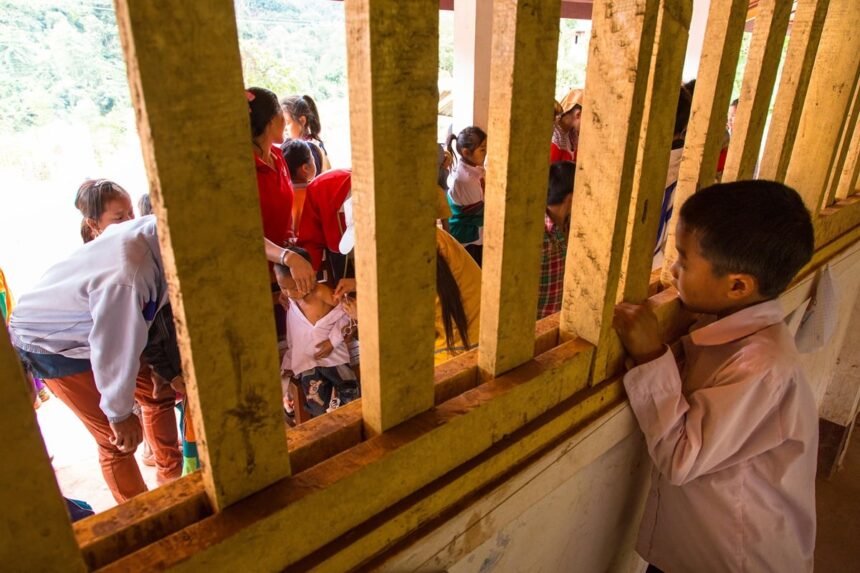“`html
In a groundbreaking initiative, over 100 nations have made significant commitments to eradicate violence against children, with nine countries specifically vowing to outlaw corporal punishment. This issue impacts approximately three out of five children in their own homes. These pledges were announced during a pivotal conference held in Bogotá, Colombia, where government representatives are expected to endorse a new global declaration focused on safeguarding children from various forms of violence, exploitation, and abuse.
The event was co-hosted by the governments of Colombia and Sweden alongside the World Health Organization (WHO), UNICEF, and the United Nations Special Representative of the Secretary-General on Violence against Children. During this gathering, several nations pledged to enhance services for survivors of childhood violence and address bullying issues. Others committed to investing in essential parenting support programs—recognized as one of the most effective strategies for mitigating risks associated with domestic violence.
“Violence is an abhorrent reality that millions of children face daily around the globe—inflicting wounds that can last generations,” stated Dr. Tedros Adhanom Ghebreyesus, Director-General of WHO. “The commitments made today have the potential to significantly alter the landscape for childhood safety if implemented effectively. From providing transformative support for families to ensuring safer educational environments and combating online abuse, these measures are crucial for shielding children from enduring harm and health complications.”
Globally, it is estimated that over 1 billion children—more than half of all minors—experience some form of violence each year. This includes child maltreatment (with corporal punishment being notably prevalent), bullying incidents, physical or emotional abuse, as well as sexual assault. Much like an invisible epidemic occurring behind closed doors, such acts often go unreported; WHO estimates indicate that fewer than half disclose their experiences while under 10% receive any form of assistance.
This type of violence not only represents a severe infringement on children’s rights but also heightens immediate and long-term health risks. Tragically, some instances lead to fatalities or serious injuries; every 13 minutes a child or adolescent falls victim to homicide—a staggering total amounting to around 40 thousand preventable deaths annually. For many others who endure such trauma during their formative years suffer lasting repercussions including anxiety disorders and depression along with risky behaviors like substance use or unsafe sexual practices which can hinder academic performance.
Research indicates that preventing violence against minors is achievable with substantial involvement from healthcare sectors playing a vital role in this endeavor. Effective interventions include parenting programs designed to help caregivers adopt non-violent disciplinary methods while fostering positive relationships with their offspring; school-based initiatives aimed at enhancing life skills among youth while curbing bullying; accessible social services tailored for young victims; legislation prohibiting all forms of child maltreatment; reducing risk factors linked with alcohol access or firearms; plus promoting safe internet practices among minors. Studies reveal that when countries successfully implement these strategies collectively they can reduce instances of childhood violence by up to 20-50%.
Global Commitments Under UN Guidelines
The first global objectives aimed at eradicating childhood violence were established within the framework set forth by the United Nations’ Sustainable Development Goals (SDGs) aligned with the UN Convention on the Rights of Child (CRC). However progress towards diminishing overall rates has been sluggish despite notable advancements in certain regions worldwide—with approximately nine out ten youngsters still residing in nations where prevalent forms such as corporal punishment remain legally permissible.
A Historic Gathering
This inaugural Ministerial Conference on Violence Against Children has attracted more than 1 thousand attendees including high-ranking government officials alongside youth representatives along with civil society advocates.
Pledges Made at The Conference
- Eight nations—including Burundi, Czechia,Gambia,Kyrgyzstan,Pakistan,Sri Lanka,Uganda,and Tajikistan—have committed themselves towards enacting laws banning corporal punishment across all settings while Nigeria focuses specifically within schools.
- A multitude pledged investments into parenting support initiatives aimed at empowering caregivers.
- The UK Government together with partners announced plans for launching a Global Taskforce dedicated towards eliminating school-related violence both directly & indirectly affecting students’ wellbeing .
- Tanzania vowed implementation Child Protection Desks across its entire network comprising twenty-five thousand schools nationwide .
- Spain expressed intentions regarding new digital legislation promoting online safety standards .
- The Solomon Islands declared raising minimum marriage age from fifteen years old up until eighteen years old recognizing early marriages pose significant threats particularly targeting adolescent girls’ welfare .
- A number countries reiterated commitment strengthening national policies developing specific action plans addressing issues surrounding children’s exposure violent circumstances.
“`






